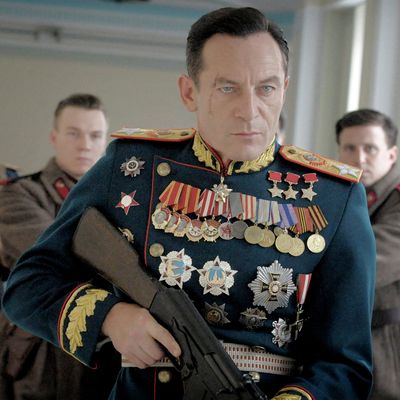
In The Death of Stalin, Armando Iannucci’s acid dramatization of the days in October 1953 when the Soviet Union lost its paranoid-psychotic totalitarian leader of three decades, the characters’ accents are Cockney, Brit-twit, and Yank — no Russian is spoken — while tortures and mass murders are ordered in tones of crisp English understatement.
It takes some time to adjust to the mix of silly, peevish bureaucrats and the serious atrocities they inflict. But that’s the beauty of the thing. Iannucci gets that grotesque horrors often emanate from egotists, clowns, and stumblebums, from small-minded people with vast and unchecked powers. As in the most unnerving satires, the glibness adds to the horror. Even the most absurd deaths have a sting.
Well, perhaps not one death, that of the big man himself: That one’s a relief. By the time Stalin (Adrian McLoughlin) falls with a thump (prompting two hapless guards outside his office to debate disturbing him, before thinking, No, better not), we’ve already observed the disfiguring effects of terror on the simplest human interactions: Any statement, however trivial, has the potential to get you hauled off and shot. Fear of getting on “the list” produces a kind of verbal slapstick in which subordinates stammer while their eyes signal panic, casting furtive glances at Stalin — and one another — for clues to their fluctuating status. Did Stalin laugh? Did Stalin frown? It makes psychological, emotional, and poetic sense that Stalin, having had a stroke, lays for 12 hours on his bedroom floor in soiled clothes because the men around him are too frightened to make a decision. Plus, Moscow’s competent doctors are either dead or in the Gulags.
The bulk of The Death of Stalin charts the battle for succession to the post of party chairman between Nikita Khrushchev (Steve Buscemi) and Deputy Prime Minister Lavrenti Beria (Simon Russell Beale). Say what you will about Khrushchev (Buscemi plays him as harried and fundamentally sweet), it’s Beale’s Beria who gives you goosebumps. Bald and thick-necked, he’s a thug who tortures with sneering relish and is seen — briefly, obliquely — preying on young women. (In life, Beria was likely both a rapist and a murderer.) In terms of brute force, Beria has the edge, and it’s fascinating to watch him work his Machiavellian wiles. To appear generous in the eyes of the people, he releases political prisoners, among them the wife of politburo higher-up Vyacheslav Molotov, of the cocktail fame. (He’s played with grandfatherly gentleness — eerie in context — by Michael Palin, carrying echoes of both Brazil and the Pythons). Beria’s mistake is replacing the Soviet Army with his more nimble NKVD (the dread People’s Commissariat for Internal Affairs), thereby making an enemy of the scarred, swaggering, imperiously mustachioed General Zhukov (Jason Isaacs), who announces to Khrushchev, “I’m smiling, but I am very fucking furious.”
As he has proved in The Thick of It (and its Anglo-American movie version, In the Loop) and Veep, the Scots-born Iannucci has a genius for depicting ridiculous minutiae, the tyrannical relentlessness of red tape, the formality of statecraft versus the chaos of personality. He doesn’t attempt to loosen the moorings and sail off into Duck Soup–y surrealism. (Scottish humor leans toward the dry.) Working with David Schneider, Ian Martin, and Peter Fellows (from a comic book by Fabien Nury and Thierry Robin), he mines mundanities for their potential to explode the status quo. As the acting premier, Malenkov, Jeffrey Tambor manages to be both glum and jumpy, feebly asserting authority while pitiably aware that he’s in over his head. He knows he can’t master the higher math of holding on to power in a system in which propaganda (Leninist or other) can be twisted to the point where a person can be celebrated or executed on the same principle.
Iannucci’s pacing — both deadpan and lickety-split — is like an exquisite straitjacket for farceurs, and it’s a pleasure to watch the Americans, Buscemi and Tambor, keep up with their seasoned British counterparts. Along with Beale (an actor of amazing versatility, physically different in every role), you can savor the stylings of Andrea Riseborough as Stalin’s giddy daughter, whose life of privilege has made her oblivious to the realities of the Soviet state; Rupert Friend as her grandiose, vodka-addled brother; and, briefly, Paddy Considine as a desperate symphony-orchestra manager whose continued existence rests on his ability to deliver a tape of a concerto (broadcast live, unrecorded) in accord with one of Stalin’s iron whims.
It’s the little things that eat into the mind. After Beria halts the execution of political prisoners, it takes some time for his order to trickle down — during which an officer in the midst of putting bullets into people’s head waves off a messenger to get one more victim in. The next man in line, spared, gazes blankly at the body of his neighbor, barely able to process the half-second difference between life and death. In such small strokes, The Death of Stalin transforms the trivial into the tragic.


